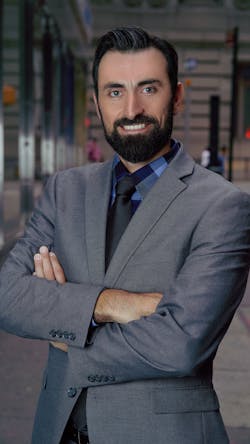2019 40 Under 40: Ian Macpherson
- Alma Mater: University of Canterbury (Christchurch, New Zealand)
- Favorite book: “Excession” by Iain Banks
- Favorite hobby(s): Mountain biking, road biking, whitewater kayaking.
- Fun fact about yourself: I’ve lived in four countries, including the U.S.
Ian Macpherson has been leading complex design through mechanical engineering for more than ten years and has become a transit industry product design expert. As current director of production engineering with New Flyer, Macpherson builds on his experience designing vehicles through several chief and director level engineering roles.
At the age of 25, Macpherson moved from New Zealand to the U.S. to work for DesignLine USA, where he was responsible for the complete design, development and validation of heavy-duty transit buses and coaches, including the launch of new hybrid and battery-electric buses.
In October of 2013, Macpherson was named systems integration manager at North American Bus Industries (NABI) in Anniston, Ala. Six months later, Macpherson was promoted to chief engineer of design and led the integration of engineering teams between NABI and New Flyer, after the NABI plant was reconfigured as a New Flyer facility in 2014. Macpherson was then named chief engineer of product improvement in 2015, responsible for leading projects focused on design and performance improvements.
Macpherson was promoted to his current role early 2019. He leads planning, designing, and testing of all production projects at New Flyer, with an international team of 200 designers, engineers, technicians, and project coordinators. Together they work on 30-40 customer contracts at any given time, supporting and helping to advance transit agencies across North America.
Over the span of his career, Macpherson has become specialized in electric propulsion and vehicle component and software integration on transit bus platforms. His technical strength has helped innovate the North American public transportation industry, most recently developing SmartRider™ – New Flyer’s intelligent electronic bus levelling system – for which he is attributed as one of the inventors of the technology that ultimately improves accessibility.
“When I was a new graduate, I was fortunate to work in an engineering consultancy where I was exposed to various projects, one of which served a bus manufacturer. This later led to a move to the US from New Zealand, and eventually, to me joining the New Flyer team.”
“I find the most rewarding part of the job (but not always the easiest!) is solving complex product issues for our customers. I am fortunate to lead a talented team with top problem-solving abilities, allowing us to come together, brainstorm, test, and implement solutions quickly when needed.”
“The complexity of manufacturing transit buses – which use an excess of 10,000 parts per bus – is a challenge. Engineering is engaged in almost all aspects of the business, from reviewing bid specifications, to design, production, and product support in the field. Buses are highly customized, so there is always a new design in development and new mobility demands to solve.”
“I am most proud of being selected as the director of engineering for New Flyer, a role I assumed only at the beginning of 2019. While I have dedicated my career to this industry, it is very gratifying to have been given this opportunity to lead a team of approximately 200 talented individuals.”
“Trust your instinct, but don’t let it replace critical thinking and proper root cause analysis, as instincts are not always correct and generally require validation with data.”
Regarding what he enjoys about the transit industry. Macpherson said, “Firstly, exposure to different technologies, products, and manufacturing methods. We are a smaller industry than automotive and heavy truck, yet we deal with lots of emerging technologies such as hybrid, electric, and fuel cell power trains and in some instances put them into production long before they have widespread adoption elsewhere. Secondly, in a more philanthropic aspect, I enjoy being part of an industry that I see as critical to solving some of the bigger environmental, social, and economic issues we currently face as a society. Buses generally cater to a cross section of society that for many reasons do not have access to their own vehicles, and it gives me pride to know we are helping provide an essential service that helps people arrive safely to where they need to be.”
